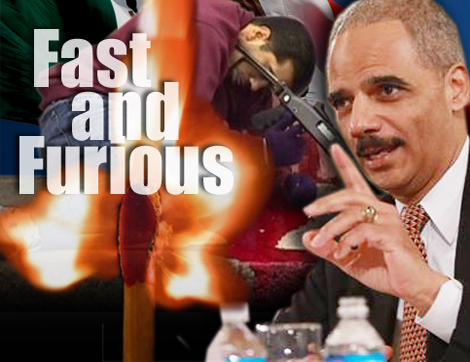
• Cartel member says U.S. traded guns for information on Mexican gangs
• Eric Holder’s ‘Fast and Furious’ may be responsible for thousands of deaths
By Pat Shannan
A high-ranking Mexican drug cartel operative alleges that the United States government’s Fast and Furious gun operation was not about tracking guns but rather about supplying them to a drug cartel—and in much larger numbers than Attorney General Eric Holder has admitted—in return for the violent gang’s help in wiping out rival drug runners.
Jesus Vicente Zambada-Niebla was the logistics coordinator for the powerful Sinaloa Cartel. He has been quietly held in various U.S. prisons since before the Fast and Furious story even broke.
Zambada-Niebla claims that the U.S. helped finance and arm the Sinaloa cartel through Fast and Furious in exchange for information that allowed the Drug Enforcement Administration (DEA), U.S. Immigration and Customs Enforcement (ICE) and other federal agencies to take down rival drug cartels. The Sinaloa cartel was thus given a monopoly and permitted to traffic massive amounts of drugs across the U.S. border from 2004 to 2009. With the evidence and testimony produced from the ongoing congressional investigation into Fast and Furious, it is now apparent that the criminal activity continued for more than two years after the 2009 date of Zambada-Niebla’s claim of firsthand knowledge.
In a motion for discovery filed in federal court in July 2011, Zambada-Niebla claims: “The Sinaloa cartel, under the leadership of defendant’s father, Ismael Zambada [Garcia], and ‘Chapo’ Guzman, was given carte blanche to continue to smuggle tons of illicit drugs into Chicago and the rest of the United States and was also protected by the U.S. government from arrest and prosecution in return for providing information against rival cartels, which helped Mexican and U.S. authorities capture or kill thousands of rival cartel members.”
According to a court motion, “Mr. Zambada-Niebla was also told that the arrangements with him had been approved at the highest levels of the U.S. government.”
Zambada-Niebla said DEA and other federal agents reneged only hours after coming to a protection agreement in exchange for his inside information. He was led to believe that under the agreement, any activities of the Sinaloa cartel, including the kind described in the indictment, were covered, and that he was immune from arrest or prosecution—even though the DEA agents knew that there was an extradition warrant outstanding for his arrest.
Instead, Zambada-Niebla was arrested by Mexican authorities five hours later and was then turned over to authorities from the United States. His federal trial is scheduled for October 9.
Pat Shannan is an AFP contributing editor and the author of several best-selling videos and books.

